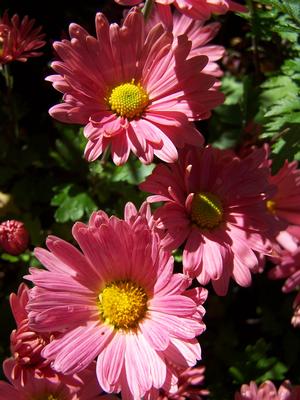Printed at http://www.quackingrassnursery.com/index.cfm/
Chrysanthemum ''hardy coral pink single''
Hardy Mum
Plant Type:
SUN PERENNIALSChrysanthemum "hardy coral pink single" - We suspect this is a named selection but really don't know. "Hardy coral pink single" is a late-bloomer with a sunny yellow button center of each medium-deep coral pink daisy-like flower, very pretty. It was on the property when we moved here in 1999 adjacent to what is presently our customer parking. I transplanted it and have been propagating it for years now. It's been tough as nails here in USDA zone 5b, the bees love it and so do we. We suspect that it would sell better if it had a cute name... this is a beauty of a hardy mum, named or not! Cutting grown. All of our cultivars are propagated by cuttings and are pot-grown.
We strongly recommend spring planting in colder regions so that the plants will be well-established by the time cold weather arrives. Cut them back to a lower leaf axil by mid-July in the north, earlier farther south; doing so will result in better-branched plants on a more compact habit adorned with even more flowers at season’s end. But if you don’t, regardless, you’ll have multitudes of flowers on longer stems but possibly more decumbent plants. All of our mums will gradually ground cover into larger and larger mats. Plant all mums in full to part sun in fertile draining soil. Honeybees love them as this is one of the last flowering perennials to bloom in such abundance in the autumn in New England, along with some of the later asters.
Characteristics and Attributes for Chrysanthemum ''hardy coral pink single''
Season of Interest (Flowering)
- Autumn
Season of Interest (Foliage)
- Spring / Summer / Autumn
Nature Attraction
- Honey Bees & Native Bees
Light
- Full Sun
Attributes
- Border
- Massing
- Natural Garden
- Wildlife Garden
Growth Rate in the Garden
- Medium
Soil
- Average
- Draining
- Fertile
Origins
- Garden Origin
Propagated By
- Cutting Grown
Genus Overview: Chrysanthemum
All of our mums are hardy in USDA zone 5. We strongly recommend spring planting in colder regions so that the plants will be well-established by the time cold weather arrives. Cut them back to a lower leaf axil by mid-July in the north, earlier farther south; doing so will result in better-branched plants on a more compact habit adorned with even more flowers at season’s end. But if you don’t, regardless, you’ll have multitudes of flowers on longer stems but possibly more decumbent plants. Plant all mums in full to part sun in fertile draining soil. Honeybees love them as this is one of the last flowering perennials to bloom in such abundance in the autumn in New England, along with some of the later asters. The heights given are flexible, determined by the conditions in which they are planted and if pruned. All of our cultivars are propagated by cuttings and are pot-grown.



